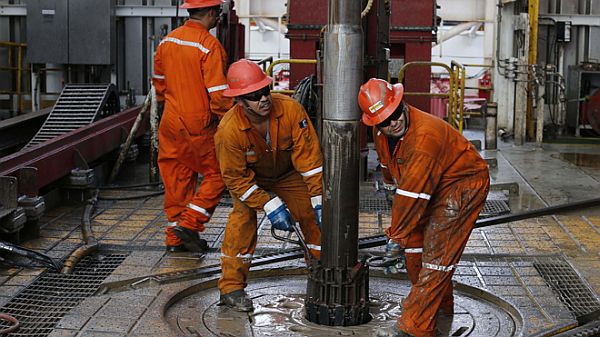Mexico City – The lowest oil prices in nearly six years couldn't have come at a worse time for Mexico, which last year opened up oil-sector investment to private companies for the first time in decades.
 |
"If we continue for the next year in the scenario that we're currently in today, it will have an impact because Pemex, i.e. Mexico, will not be getting the same revenues that it's getting out of their current production," said Jorge Pinon, an oil and energy analyst at the University of Texas. "That's simple arithmetic."
It all adds up to another political headache for President Enrique Peña Nieto and his Institutional Revolutionary Party, or PRI, as it heads into June's midterm elections. The oil downturn comes as Mexicans protest the September disappearance of 43 college students, allegedly murdered by a drug gang in league with local police, and critics deride Peña Nieto, his wife and his finance minister for buying luxurious properties from government contractors.
"Given the very mediocre performance of the economy in the last two years, they were hoping for a better showing in order to arrive at the ballot box with something to show," said Dwight Dyer, a senior analyst for Mexico and the Americas at Control Risks in Mexico City. "This puts significant pressure on the PRI electorally."
After trading at a high of $115 a barrel last year, oil plummeted to around $44 a barrel in late January, the lowest since April 2009. U.S. benchmark crude recovered somewhat to more than $50 a barrel this week, but some industry analysts say prices may not yet have found their floor with a worldwide glut still in place and global economic growth sluggish.
How long oil remains in the basement — or how long the industry believes it will — stands to affect private bidding on exploration, development and optimization contracts in Mexico this year.
Pinon said oil would have to be around $77 a barrel for some of the Mexican projects to be profitable. So shale deposits, for example, will be less attractive as long as potential investors have doubts about price.
 |
In the medium to long term, Mexico's reform almost certainly will improve the energy sector and overall economic performance, Dyer said. But for now, oil's slump stands to "kick the can down the road," especially for shale, which is more technically challenging.
"Looking at the prospects at this moment, it looks like a tough situation," he said. "I wouldn't say this will derail energy reform, but rather the expectations will have to be adjusted toward lower bids than expected, less investment."
Mexican Treasury Secretary Luis Videgaray said recently that bidding on unconventional projects likely would be delayed.
The Mexican government relies on oil revenue for about a third of its spending and calculated this year's budget based on an average price of $79 a barrel. The $8.4 billion cut it made from its budget represented roughly 3 percent of projected spending and will be noticeable. Cuts include major infrastructure projects, including a high-speed rail project between the capital and the growing industrial center of Queretero that also was tainted by the conflict-of-interest allegations. The cutbacks also will affect Mexico's working class — would-be beneficiaries of the federal pension system, educational and other workers who make up the base of the ruling party.
Mexico's pain could have been much worse without an aggressive hedging program in futures markets that it has pursued for years even when oil soared above $100 a barrel. The country locked in a price of $76.40 a barrel for much of its 2015 production, essentially giving it insurance against the vagaries of international markets.
 |
The hedging means Mexico is far better off in the near-term than several other oil-producers in Latin America — above all Venezuela, which gets nearly all its income from crude and was already struggling with a deep recession, 60 percent inflation and increasingly severe shortages of food and other goods.
Colombia and Ecuador each get more than half their export earnings from oil and are taking steps to stem their losses. Argentina, which passed a law in November aimed at luring foreign investment in oil projects, also could see diminished interest.
While low oil prices are bad for Pemex and Mexico's budget, they could potentially lift the broader economy if they lead to growth in the neighboring United States, Mexico's largest trading partner.
Michael Levi, senior fellow for energy and the environment at the Council on Foreign Relations, said Mexico's government still needs to do more to ease its dependence on oil, including diversifying its sources of federal revenue and improving tax collection.
"Mexico's hedging program probably makes a lot of other countries jealous right now, but it's not a long-term response to oil prices," Levi said.
"This year is not where things can really bite," he added. "If a substantially lower price lasts for another year or two, they end up in a much more stressful situation."
Original article


